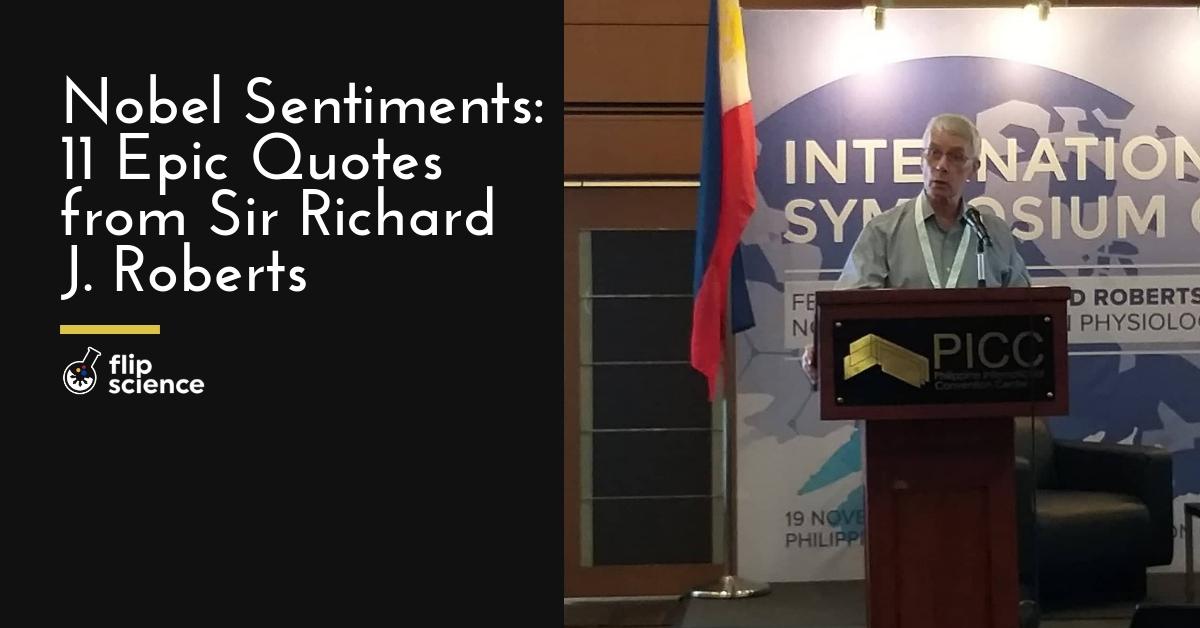Read Nobel Prize-winning microbiologist Sir Richard J. Roberts’ witty insights on science, the youth, the media, and why he prefers bacteria over people.
Nobel laureate Sir Richard J. Roberts spoke at the International Symposium on Science, Technology, and Innovation on November 19, 2018 at the Philippine International Convention Center in Pasay City. There, he answered questions from the media and shared his views on various topics.
Here are some of his most interesting insights and responses.
On the simplicity of bacteria and the complexity of humanity
“I like to look at very simple things, which is why I like to look at bacteria so much. Even though bacteria are unbelievably complicated, they’re so simple in comparison to people.”
On having a supportive wife
“I am very lucky that she is quite tolerant of the fact that I work really hard and that I love science.”
On supporting the youth as science advocates
“I’m a great believer in youth; I think the nice thing about young people doing science is that they ask the sort of questions that I would no longer ask. Because if I were to ask some of these questions, people would look at me and say, “Well, how come you don’t know the answer?” And then they’d think I was stupid. And so what happens is when you get older, you tend not to ask the stupid questions that sometimes lead to new insights.”
On taking advantage of luck
“Every person in this room will have luck at some point. When it comes, take advantage of it, because if you don’t, then what was the point of having it?”
On being a vocal science advocate
“Well, one of the things that I discovered after I won the Nobel Prize is that I would be talking to people, and all of a sudden, they would listen. I’m saying exactly what I said before I got the Nobel Prize, and they didn’t listen. And so, what the Nobel Prize does is it gives you an opportunity to talk to people and have them listen. And if two, three, five, ten Nobel laureates say the same thing, people tend to listen harder.”
On why we should never disregard basic science in favor of applied science
“I think that’s why it’s hard to judge basic science — because you never know how long it’s going to take before it will lead to a discovery.”
On whether the media approaches science the right way
“I think sometimes the media asks the right questions — I’m not sure they always listen to the answers.”
On vaccination and anti-vaxxers
“Vaccination is the best medicine we’ve got. For people to come in and say it’s bad… this is awful. Absolutely awful. And you end up killing people.”
On why the Philippines should invest in research
“Invest in basic research so you can make the discoveries that everybody else will want to use. You don’t have to do everything. You just find some little niche area, something that you’re interested in here, or something that there’s an individual here in this country with a very good idea of how to do it that no one else is doing.”
On persevering in the face of failure, frustration, and inadequate funding
“I think you can’t do research and not become frustrated.”
On the secret to winning a Nobel Prize
“Winning a Nobel Prize depends on luck. You have to make a discovery. You can’t go out and say, “I’m going to do research that is going to lead to a big discovery. If you could do that, it wouldn’t be a discovery, because you would already know what the answer was.”
Author: Mikael Angelo Francisco
Bitten by the science writing bug, Mikael has years of writing and editorial experience under his belt. As the editor-in-chief of FlipScience, Mikael has sworn to help make science more fun and interesting for geeky readers and casual audiences alike.







